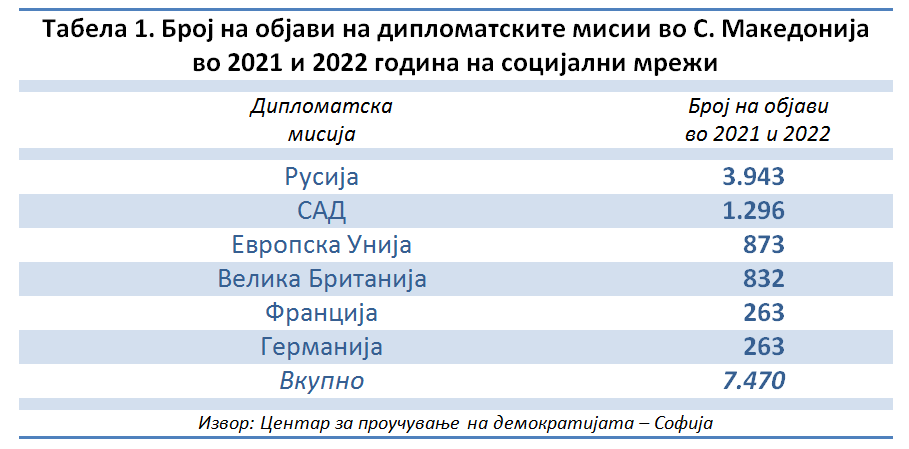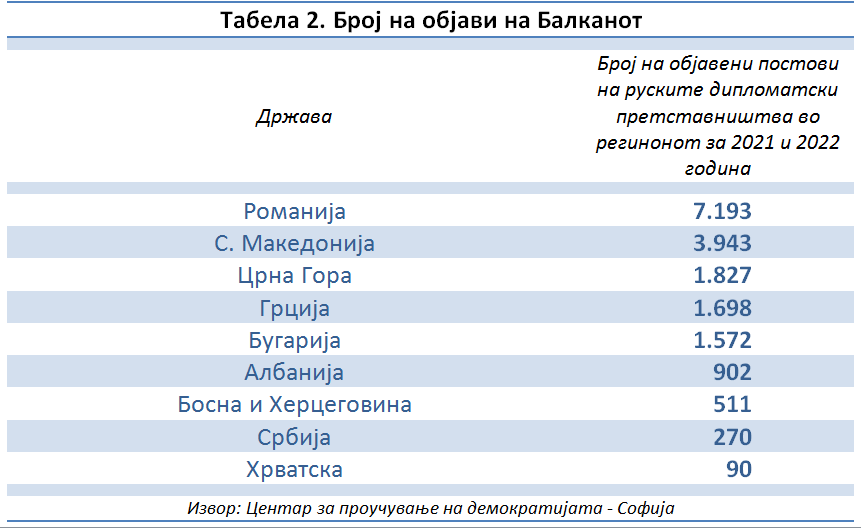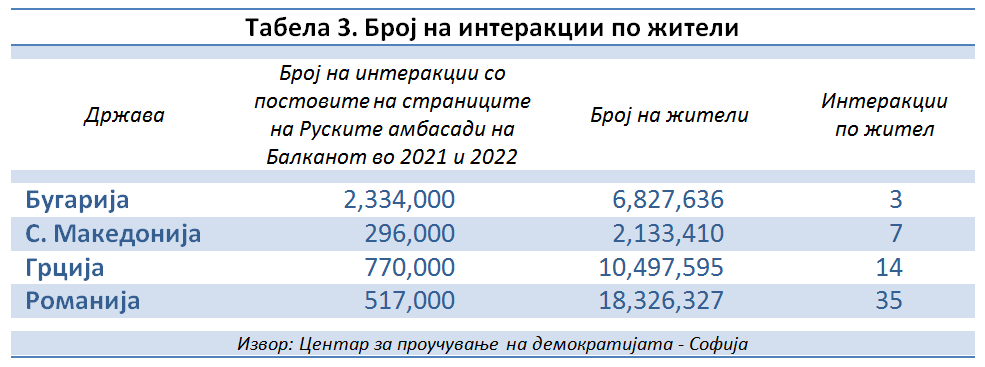The Russian Embassy in Skopje is a record-breaker when it comes to the number of Facebook posts. The country is of top regional interest of Kremlin – out of the whole Balkans, only the Russian diplomatic mission in Romania posts more frequently on Facebook. The hybrid war in North Macedonia by the Russian Secret Services is a reality, Truthmeter reports.
In the last two years, the Russian Embassy in Skopje has published a high average of 5 posts per day on its Facebook page. This is shown by the research of the Centre for the Study of Democracy from Sofia that has been monitoring the posts of several embassies on the Balkans in the last two years.
This significant number of posts of the Russian Embassy in Skopje is multiple times higher than the number of posts at the official page of the Macedonian Ministry of Foreign Affairs, which has 3 posts per week in average (a total of 5 in March so far and a total of 12 posts in February 2023), approximately 40 percent of the total number of posts published on the Facebook page of the Macedonian Government that disseminates approximately 12 posts per day (March 2023) in average.
According to Goran Georgiev, researcher in the Centre for the Study of Democracy in Sofia, the activities of the Russian Embassy cannot be compared with those of the others.
Research data was collected by means of monitoring with the help of specialized software for extracting data from online media, social network profiles of politicians, public figures and diplomats, online communication channels of diplomatic representations from the Balkan region, says Georgiev.
He stresses that North Macedonia is one of the central countries of Russian propaganda.
According to the number of posts published on the social network Facebook, the diplomatic missions of the European Union, as well as France, Germany, Russia, United Kingdom and the USA in North Macedonia have published around 7,500 posts in 2021 and in 2022. More than 50 percent of these posts are from the Russian diplomatic mission in the country.

From all the countries of former Yugoslavia, the largest number of posts were published in North Macedonia, while more posts have been published only in Romania from the entire Balkans. There, from a total of 10,500 posts, the Russian diplomatic mission has published 7,100 posts.

This is highly relevant since over 90 percent of the traffic achieved on the social networks in South-East Europe takes place on Facebook.
According to the number of interactions or engagement per capita with the posts published by the diplomatic missions, such as “likes”, “comments” and “shares”, the Facebook page of the Russian Embassy in North Macedonia is also at the top in the Balkans.
 Bulgaria has the most user interaction of posts on the Facebook pages of the Russian Embassy i.e., 2.3 million interactions, followed by Greece with 770,000, Romania with 517,000 and North Macedonia with 296,000. When this data is divided with the number of population, then in Bulgaria there is one interaction on every third inhabitant, while in Macedonia that is the case with every 7th inhabitant, every 14th in Greece and in Romania every 35th inhabitant has one interaction.
Bulgaria has the most user interaction of posts on the Facebook pages of the Russian Embassy i.e., 2.3 million interactions, followed by Greece with 770,000, Romania with 517,000 and North Macedonia with 296,000. When this data is divided with the number of population, then in Bulgaria there is one interaction on every third inhabitant, while in Macedonia that is the case with every 7th inhabitant, every 14th in Greece and in Romania every 35th inhabitant has one interaction.
Since 2014 we are in a hybrid war with Russia. The Balkans were, especially, the target of this war. The quantity of published disinformation started to rapidly grow with the beginning of the war in Donbas in 2014. The Russian State created and controlled many websites. We have information pointing out that specific websites in Bulgaria were created by the Russian State i.e., the Russian Secret Services, says Georgiev.
He also added that the tactics of Russian propaganda have changed as well.
Russia has no need to invest in our traditional media. Through social network groups, Russia accomplishes its goals, says Georgiev.
Analyst Xhelal Neziri has been researching Russian propaganda in North Macedonia and in the Balkans for quite some time. According to him, the influence of Russian propaganda is obvious.
Since 2016, when the efforts to resolve the name dispute with Greece intensified, Russia increased its diplomatic staff in the country. Obviously, Moscow was not in favour of resolving the dispute with Greece because that opened the doors for NATO membership of the country. Until 2018, Russian influence in the country was present in the form of “soft power”, through the centres for culture, investments, education etc. After the adoption of the Prespa Agreement that same year, thereby finally resolving the issue with Greece and lifting the veto for NATO-membership, Russian embarked upon a hybrid war against our country. At the time, even the Russian Foreign Minister, Sergey Lavrov, announced that North Macedonia became a legitimate Russian target with its NATO-membership, says Neziri.
Neziri believes that Putin’s regime is utilizing all possible tools to sustain and strengthen pro-Russian sentiment in the country. Such support is useful to Moscow so that it can direct the citizens of North Macedonia towards its own agenda, to build a dominant pro-Russion position about on the current security and geopolitical issues thereby stirring them towards a specific political party or option that is either pro-Russian or its political performance is compatible with the Russian agenda of the region.
He also adds that since North Macedonia became a NATO-member in March 2020, it has become constant target of hybrid war which will probably remain the case in the upcoming period. The reason for this is the fact that as the latest NATO-member, the country is seen as the “Achilles heel” of the Alliance.



